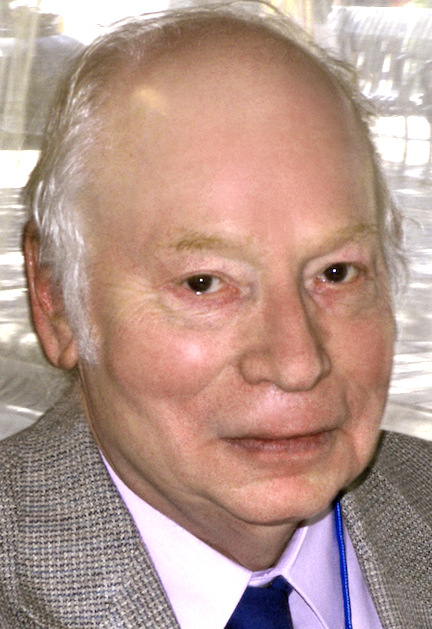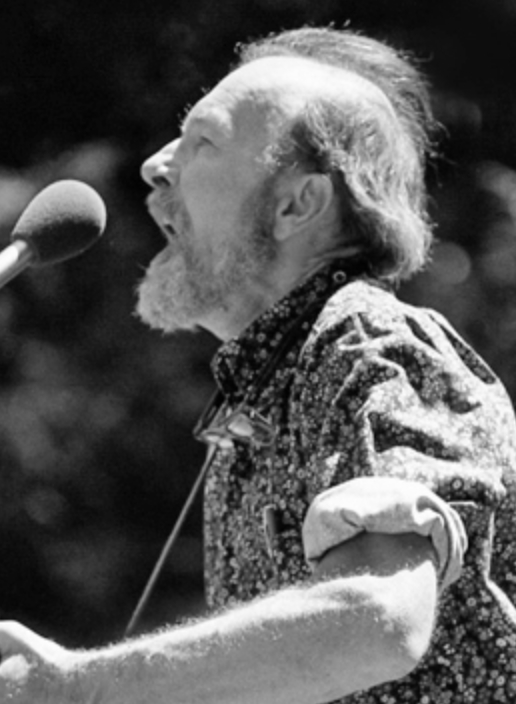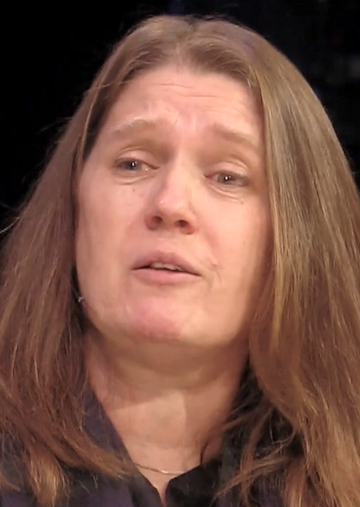May 3
Steven Weinberg

On this date in 1933, Steven Weinberg was born in the Bronx, N.Y. He received his undergraduate degree in physics from Cornell University in 1954, which he attended on a scholarship. There he met his future wife, Louise Goldwasser. They married in 1954. She became a professor of law at the University of Texas. Weinberg began his graduate study at the Institute for Theoretical Physics in Copenhagen (now the Niels Bohr Institute). He completed his Ph.D. at Princeton in 1957.
In 1979 Weinberg was awarded the Nobel Prize in physics along with Abdus Salam and Sheldon Lee Glashow “for their contributions to the theory of the unified weak and electromagnetic interaction between elementary particles, including, inter alia, the prediction of the weak neutral current.” This was one of the most significant scientific advances in the second half of the 20th century.
He received many other awards, including the national Medal of Science in 1991. He was also a foreign member of the Royal Society of London. Known for his writing, Weinberg received the Lewis Thomas Prize, which is awarded to the researcher who best embodies “the scientist as poet.”
Weinberg wrote hundreds of scholarly articles and textbooks such as The Quantum Theory of Fields (three volumes: 1995, 1996, 2003) and Cosmology (2008); the more popular works The First Three Minutes: A Modern View of the Origin of the Universe (1977) and Dreams of a Final Theory (1993, which contains a chapter called “What About God?”). His collection Facing Up: Science and its Cultural Adversaries was published in 2001, and Lake Views: This World and the Universe in 2011.
Weinberg was outspoken about his lack of religion and encouraged other scientists to be more vocal in their opposition to religious ideas. He said, “As you learn more and more about the universe, you find you can understand more and more without any reference to supernatural intervention, so you lose interest in that possibility. Most scientists I know don’t care enough about religion even to call themselves atheists. And that, I think, is one of the great things about science — that it has made it possible for people not to be religious.” (Quoted in Natalie Angier, “Confessions of a Lonely Atheist,” The New York Times, Jan. 14, 2001)
He added, “The whole history of the last thousands of years has been a history of religious persecutions and wars, pogroms, jihads, crusades. I find it all very regrettable, to say the least.” Five years later at a forum at the Salk Institute for Biological Studies in San Diego, he said: “Anything that we scientists can do to weaken the hold of religion should be done and may in the end be our greatest contribution to civilization.” (New York Times, Nov. 21, 2006)
In 1999 he became the first recipient of FFRF’s Emperor Has No Clothes Award, reserved for public figures who make known their dissent from religion. He began his acceptance speech: “I enjoy being at a meeting that doesn’t start with an invocation!” He said, “Nothing has been more important in the history of science than the work of Darwin and Wallace pointing out that not only the planets but even life can be understood in this naturalistic way.” More excerpts from his speech can be found here.
He died at age 88 at a hospital in Austin and was survived by his wife Louise and their daughter Elizabeth. (D. 2021)
“Religion is an insult to human dignity. With or without it you would have good people doing good things and evil people doing evil things. But for good people to do evil things, that takes religion.”
— Weinberg address at the Conference on Cosmic Design, American Association for the Advancement of Science, Washington (April 1999)
Pete Seeger

On this date in 1919, Peter Seeger was born in Manhattan to musicologist Charles Seeger and concert violinist Constance de Dyver Edson Seeger. Best known for his legendary contributions to folk music, he wrote such songs as “If I Had A Hammer” and the anti-war song “Where Have All the Flowers Gone.” He popularized the German folk song “Die Gedanken Sind Frei,” which celebrates freedom of thought. He was committed to social activism throughout his entire life, lending his music and his voice to the civil rights movement, anti-war efforts and the environment.
Seeger was exposed to folk music early on, as his father and stepmother collected and transcribed rural American folk music. He attended Harvard University with the intention of becoming a journalist but dropped out after two years and moved to New York City. He began to work with other folk performers and his career was launched.
At age 20 Seeger married Toshi-Aline Öta, with whom he had four children. Due to his affiliation with the Communist Party in the 1940s, he was summoned before the House Un-American Activities Committee in 1953 and indicted for contempt of Congress in 1957, though the indictment was overturned a year later. In his testimony, he said, “I am not going to answer any questions as to my association, my philosophical or religious beliefs or my political beliefs, or how I voted in any election, or any of these private affairs. I think these are very improper questions for any American to be asked, especially under such compulsion as this.”
Seeger continued to write music and perform around the world into the 21st century. In 1972 he was inducted into the Songwriters Hall of Fame. He received a Lifetime Achievement Award in 1993. In 1994 he was honored by the Kennedy Center. He was also awarded the National Medal of Arts that same year. In 1996 he was inducted into the Rock and Roll Hall of Fame under the category of Early Influences.
When asked about his religious views in a Beliefnet interview (March 16, 2007), Seeger described himself as a pantheist, saying, “I feel most spiritual when I’m out in the woods. I feel part of nature. Or looking up at the stars. [I used to say] I was an atheist. Now I say, it’s all according to your definition of God.” (D. 2014)
PHOTO: Seeger performing in 1978; Brian McMillen photo (cropped) under CC 4.0.
Give Me That Old Time Religion
(Pete Seeger)
Give me that old time religion
Give me that old time religion
Give me that old time religion
It’s good enough for me.
We will pray with Aphrodite,
We will pray with Aphrodite,
She wears that see-through nightie,
And it’s good enough for me.
We will pray with Zarathustra,
We’ll pray just like we use ta,
I’m a Zarathustra booster,
And it’s good enough for me.
We will pray with those Egyptians,
Build pyramids to put our crypts in,
Cover subways with inscriptions,
And it’s good enough for me.
We will pray with those old druids,
They drink fermented fluids,
Waltzing naked though the woo-ids,
And it’s good enough for me.
We do dances to bring water,
Prepare animals for slaughter,
Sacrifice our sons and daughters,
And it’s good enough for me.
I’ll arise at early morning,
When my Lord gives me the warning,
That the solar age is dawning,
And it’s good enough for me.
“I leaf through [the bible] quite often — if only to shake my head in disgust. I quote Leviticus to people who think that every word in the Bible is absolutely gospel and you need to obey every word. In Leviticus it says you must kill a bull if you’re going to really love God. And you must kill it in a certain way, or else you will be killed.”
— Seeger interview, Beliefnet (March 16, 2007)
Mary L. Trump

On this date in 1965, psychologist and author Mary Lea Trump was born in New York City to Linda Lee Clapp, a flight attendant, and Fred Trump Jr., a commercial airline pilot and future President Donald Trump’s older brother. She has a brother, Fred Trump III.
Her father died of a heart attack exacerbated by alcoholism at age 42 when she was 16. “We were sort of knee-jerk Protestants. We didn’t go to church much. I did Sunday School for a little bit. I actually used to wear a cross, which I think is hysterical now. As soon as my dad died, though, it was over for me.” (Sydney Morning Herald, Sept. 17, 2021)
She studied English literature at Tufts University in Massachusetts, earned a master’s in English literature at Columbia University and received a Ph.D. in clinical psychology from Adelphi University on Long Island, N.Y. Trump worked at the Manhattan Psychiatric Center while doing research for her doctorate and later taught graduate courses in developmental psychology, trauma and psychopathology. She received certification as a professional life coach and founded a New York-based company in 2012 called the Trump Coaching Group.
She contributed to the book “Diagnosis: Schizophrenia,” published by Columbia University Press in 2001. Her book “Too Much and Never Enough: How My Family Created the World’s Most Dangerous Man” was an unauthorized 2020 biography of her uncle Donald. Legal efforts to stop publication failed and it sold nearly a million copies on the first day of sales.
Her 2021 book “The Reckoning: Our Nation’s Trauma and Finding a Way to Heal” detailed damage to the U.S. from what Trump called systemic racism and the nation’s failure to address the scourge of white supremacy. She hosts “The Mary Trump Show,” a podcast focusing on “politics, pop culture and everything in between.”
In “Too Much and Never Enough,” Trump said the family’s homophobia caused her to stay in the closet for many years out of fear of being disowned. She wrote that her grandmother, Mary Anne MacLeod Trump, called Elton John a “faggot” who shouldn’t be performing at Princess Diana’s memorial, so she hid her plans to marry a woman. Now divorced, Trump conceived a daughter, Avary, through in-vitro fertilization, raising her on Long Island.
She has expressed concern that “increasingly there is an empowering of white evangelical Christians who are increasingly intolerant and have an outsized voice in our politics. I don’t think you can be elected to higher office in this country if you don’t espouse religious views. That’s really troubling.” (Ibid.)
Asked how Donald Trump was able to successfully court evangelicals despite his lack of religion, she commented: “He certainly hasn’t read the Bible. This is a thrice-married person, with five children from three different marriages, who has 26 accusations of sexual assault against him. And yet you know what they said? That God ‘sometimes picks imperfect vessels.’ ” (Ibid.)
PHOTO: Trump at the Nexus Institute roundtable “Why is fascism popular again?” in December 2021. YouTube screenshot under CC 3.0.
“It just seemed absurd that there could be any kind of higher power. None of it made sense to me any more. So, since the age of 16, I have been an unwavering atheist. And I worry a lot about how religion is intertwined in politics in this country.”
— Trump, on the unexpected death of her father at age 42, Sydney Morning Herald (Sept. 17, 2021)
